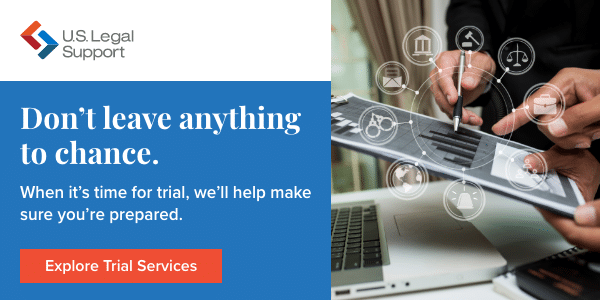Preparing a Witness for Cross Examination

It’s always seen in courtroom dramas—the smirking attorney who drives a witness into an emotional frenzy that leads to an admission of perjury, guilt, or confusion. The real experience is rarely as flamboyant as TV episodes suggest, but there are real pressures and emotions to manage when testifying.
For example, how do you ensure that your client’s nerves don’t come across as evidence of lying? Or that they aren’t too shocked by invasive questions to respond effectively?
Learn how to prepare for cross examination with this list of cross examination do’s and don’ts.
Tips for Effective Witness Testimony During Cross Examination
Witness preparation is one of the most important pre-trial steps to help have effective witnesses. When you prepare your witnesses, provide them with both written tips and a discussion to review the methods that will increase their credibility and bolster their testimony. Hiring a jury consultant to help with witness preparation is a great way to help ensure all of your trial needs are being met.
#1 Tell the Truth (and Only the Truth)
Discuss the importance of sticking with factual answers and when to simply state “I don’t know/recall,” as well as the critical importance of avoiding untruths (statements that are considered misrepresentations of the truth).
#2 Keep It Brief
Explain to your witness not to fill empty space with chatter or volunteer information beyond concise answers (particularly to yes and no questions). These habits are hard to break, so explain to them the importance of providing brief and factual responses during cross examination questions.
#3 Maintain a Consistent Demeanor
Switching from a smile to a growl as soon as opposing counsel steps up to bat is a red flag for believability.
#4 Be Serious
While being cross-examined at trial or in a deposition, your witness should avoid going past “pleasant” on the joy dial. Laughter and smiles can be used by opposing counsel to reduce a witness’s credibility or slip past their guard before an attack. Remind witnesses to avoid:
- Telling or laughing at jokes
- Smiling or laughing nervously if possible
#5 Communicate Through Clear Speech
If your witness is used to replacing speech with gestures and mumbles, be sure they understand the need for a verbatim record in legal proceedings. They should:
- Speak a “yes” or “no” instead of a nod or head-shake
- Use words instead of indicators like “mhmm” or “nuh-uh”
- Avoid nonverbal expressions such as snorting to display derision
#6 Be Aware of Posture
How we sit and arrange ourselves can project defensiveness, fear, or confidence. Utilize open body posture, sitting up attentively but without tension on the witness stand. Avoid closed-off, unapproachable postures such as crossed legs or arms.1
#7 Ask for Clarification
Witnesses aren’t expected to understand every nuance of legal process or language. Be sure they know they can ask for a question to be repeated or rephrased if they don’t understand it.
#8 Understand the Dangers
You don’t want to overload or instill fear in your witnesses, but they do need to understand what’s at risk and how their actions could increase those risks. Be sure to review:
- The danger of perjury to the case and to the witness
- Potential landmines that could lead to a mistrial or appeal
- The need to convey credibility and reliability during cross
Common Mistakes for Your Witness to Avoid During Cross Examination
Preparing for cross examination includes some “don’t” items in addition to the do list. Ensure they:
#9 Don’t Speculate
Beyond providing professional opinions within the scope of expert witness testimony, make sure your witnesses know to stick to the facts. They should avoid:
- Personal opinions
- Speculation
- Beginning responses with “I think…” or “Maybe…”
#10 Don’t Speed
Stay at a thoughtful pace in both listening to cross examination questions and answering them. If counsel tries to speed up during questioning, ask them to slow down, repeat a question, or ask you a single question at a time.
#11 Don’t Bring Notes or Documents
If you know you’ll be questioned on dates, names, or other details, it’s tempting to bring bullet points and reminders. Witnesses need to understand that any written item they refer to can be challenged and inspected by opposing counsel. They must study the facts before trial but leave appointment books and other references at home.
Consult with a Leader in Witness Preparation
Since 1996, U.S. Legal Support has provided exceptional litigation support services to legal industry partners. Our Trial Services division can help with all aspects of remote and live witness readiness, including preparing a witness for cross examination.
We offer support for every aspect of trial preparation, including jury consulting, mock trial focus groups, court reporting and transcription, and record retrieval and analysis.
Ready to learn more? Contact us today by phone, email, or request form.
Sources:
- Passive Secrets. 15 Crucial Body Language Statistics To Know in 2022 (Fun Facts). https://passivesecrets.com/body-language-statistics-and-facts/

Editoral Policy
Content published on the U.S. Legal Support blog is reviewed by professionals in the legal and litigation support services field to help ensure accurate information. The information provided in this blog is for informational purposes only and should not be construed as legal advice for attorneys or clients.


